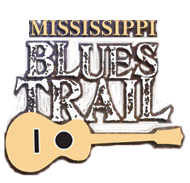Albert King
Albert King - Indianola
Albert King (1923-1992), who was billed as “King of the Blues Guitar,” was famed for his powerful string-bending style as well as for his soulful, smoky vocals. King often said he was born in Indianola and was a half-brother of B. B. King, although the scant surviving official documentation suggests otherwise on both counts. King carved his own indelible niche in the blues hierarchy by creating a deep, dramatic sound that was widely imitated by both blues and rock guitarists.
Albert King’s readily identifiable style made him one of the most important artists in the history of the blues, but his own identity was a longtime source of confusion. In interviews he said he was born in Indianola on April 25, 1923 (or 1924), and whenever he appeared here at Club Ebony, the event was celebrated as a homecoming. He often claimed to be a half-brother of Indianola icon B. B. King, citing the fact that B. B.’s father was named Albert King. But when he applied for a Social Security card in 1942, he gave his birthplace as “Aboden” (most likely Aberdeen), Mississippi, and signed his name as Albert Nelson, listing his father as Will Nelson. Musicians also knew him as Albert Nelson in the 1940s and ’50s. But when he made his first record in 1953–when B. B. had become a national blues star–he became Albert King, and by 1959 he was billed in newspaper ads as “B. B. King’s brother.” He also sometimes used the same nickname as B. B.–“Blues Boy”–and named his guitar Lucy (B. B.’s instrument was Lucille). B. B., however, claimed Albert as just a friend, not a relative, and once retorted, “My name was King before I was famous.”
According to King, he was five when his father left the family and eight when he moved with his mother, Mary Blevins, and two sisters to the Forrest City, Arkansas, area. King said his family had also lived in Arcola, Mississippi, at one time. He made his first guitar out of a cigar box, a piece of a bush, and a strand of broom wire, and later bought a real guitar for $1.25. As a southpaw learning guitar on his own, he turned his guitar upside down. King picked cotton, drove a bulldozer, did construction, and worked other jobs until he was finally able to support himself as a musician.
King’s first band was the In the Groove Boys, based in Osceola, Arkansas. In the early ’50s he also worked with a gospel group, the Harmony Kings, in South Bend, Indiana, and–as a drummer–with bluesman Jimmy Reed in the Gary/Chicago area. He recorded his debut single for Parrot Records in Chicago before returning to Osceola and then moving to Lovejoy, Illinois. Recordings in St. Louis drew new attention to his talents and a stint with Stax Records in Memphis (1966-1974) put his name in the forefront of the blues. Rock audiences and musicians created a new, devoted fan base, while King’s funky, soulful approach helped him maintain a following in the African American community. Among his most notable records were Live Wire/Blues Power, an album recorded at the Fillmore in San Francisco, and the Stax singles “Born Under a Bad Sign,” “Cross Cut Saw,” “The Hunter,” and “I’ll Play the Blues for You.” King remained a major name in blues and was elected to the Blues Hall of Fame in 1983, but he never enjoyed the commercial success that many of his followers (including Eric Clapton and Stevie Ray Vaughan) did. He died after a heart attack in Memphis, his frequent base in his final years, on December 21, 1992.
content © Mississippi Blues Commission
Captions
Willie Clayton (b. 1956), another Indianola area native who became a prominent performer on the Southern soul and blues circuit, performed on bills with Albert King and, like King, began making homecoming appearances at the Club Ebony.
[ BACK TO TOP ]

